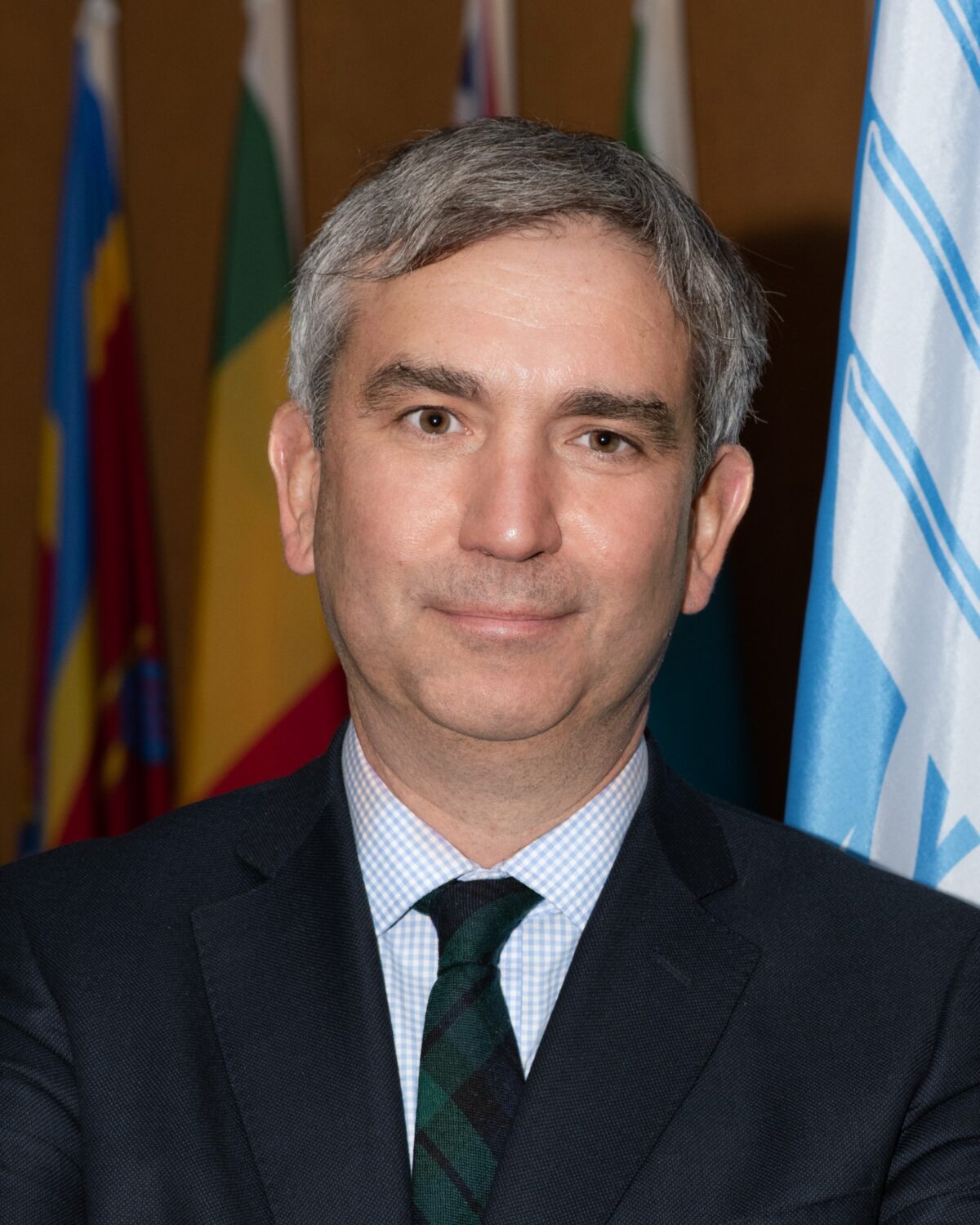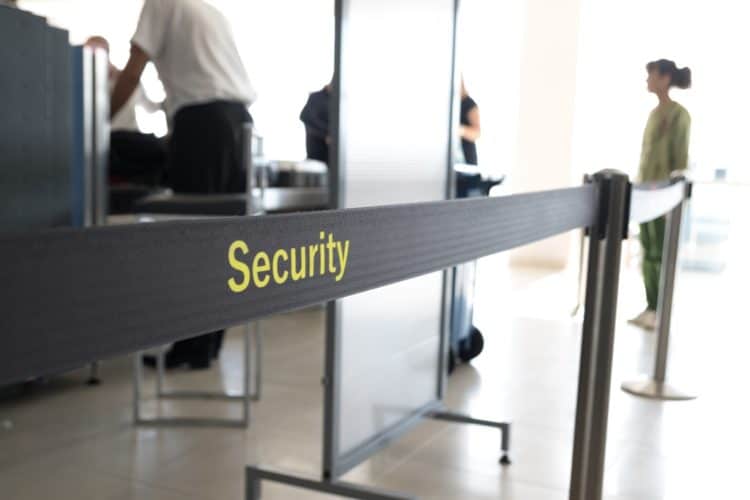In this series of interviews with ICAO Directors, Michael Gill, the Director of the ICAO Legal Affairs and External Relations Bureau, discusses the legal aspects of ICAO’s work as the aviation industry recovers from the COVID-19 pandemic, and he also shares his Bureau’s work as it relates to CORSIA, UN Sustainable Development goals, aviation security, strategic planning, policy development, and efforts to harmonize the international legal and regulatory framework.
The ICAO Secretariat consists of five bureaus: the Air Navigation Bureau, the Air Transport Bureau, the Technical Co-operation Bureau, the Legal Affairs and External Relations Bureau, and the Bureau of Administration and Services. The Legal Affairs and External Relations Bureau provides advice and assistance to the ICAO Secretary General and through him to the ICAO Council and other bodies of the Organization. They also provide assistance to ICAO Member States on constitutional, administrative and procedural matters, on problems of international law, air law, commercial law, labour law and related matters. The Bureau conducts research and studies in the field of private and public international air law, prepares documentation for, and serves as the Secretariat of the Legal Committee: relevant bodies of the Assembly; and Diplomatic Conferences which adopt multilateral treaties on international air law.

Q.: Per its preamble, States joined the 1944 Convention on International Civil Aviation and created ICAO “in order that international civil aviation may be developed in a safe and orderly manner and that international air transport services may be established on the basis of equality of opportunity and operated soundly and economically.” Over 75 years later, and as we emerge from the havoc of the pandemic, how do you see this shaping the legal aspects of ICAO’s work?
The principles enshrined in the Preamble of the Chicago Convention are certainly key in ICAO’s legal work. For example, our work on unmanned aircraft and cyber-threats is at the forefront of new developments in international civil aviation. But we also continue to look at the interpretation and implementation of some key provisions of the original Convention, like article 12 (Rules of the Air) and article 21 (Report of registrations). And when differences between Contracting States do arise, it is important that a robust and effective mechanism to resolve them is available so our work on updating the Rules for the Settlement of Differences is crucial. Work on all of these items will help in meeting ICAO’s objectives which are set forth in the Preamble of the Convention.
In other words, although it was adopted over 75 years ago, the text of the Preamble remains more relevant than ever, as our industry seeks to recover from the devastating human, natural, and economic impact of the pandemic. Equality of opportunity and sustainability will be at the heart of ensuring all states can access air transport as a catalyst for sustainable development.
 Q.: International air connectivity provides significant impacts for States with respect to the attainment of 15 of the 17 sustainable development goals (SDGs) set forth under the UN Agenda 2030, highlighting the importance of ICAO’s work to encourage the safe and orderly development of the sector and its economical operations. Given however that the Chicago Convention does not give ICAO enforcement powers, how does this work?
Q.: International air connectivity provides significant impacts for States with respect to the attainment of 15 of the 17 sustainable development goals (SDGs) set forth under the UN Agenda 2030, highlighting the importance of ICAO’s work to encourage the safe and orderly development of the sector and its economical operations. Given however that the Chicago Convention does not give ICAO enforcement powers, how does this work?
Although the Convention does not provide ICAO with enforcement powers, States have bound themselves to comply with the provisions of the Standards contained in the Annexes unless they are not in a position to meet them.
ICAO has put in place several mechanisms in order to assist States in complying with the international requirements adopted by the Organization. Think of the USOAP and the USAP These programmes are beneficial for States because they assist them in enhancing their compliance with SARPs. Moreover, the Organization assists States in enhancing their compliance with ICAO requirements through the publication of guidance material (such as Manuals and Circulars) as well seminars and training, like our GAT courses.
Overall, the tools and mechanisms that ICAO has developed under the Convention framework certainly contribute to the safe and economical development of the sector which in turn underpins aviation’s contribution to the SDGs.
 Q.: Orderly development in the 21st century surely refers to, inter alia, what we now call sustainable development. One of the most significant agreements reached by the Assembly in recent years, especially in regard to the environment, is the 2016 CORSIA agreement. Could you explain to us what legal vehicle was used by States to adopt that agreement?
Q.: Orderly development in the 21st century surely refers to, inter alia, what we now call sustainable development. One of the most significant agreements reached by the Assembly in recent years, especially in regard to the environment, is the 2016 CORSIA agreement. Could you explain to us what legal vehicle was used by States to adopt that agreement?
CORSIA was adopted through Assembly Resolution and certain of its implementation elements are governed by SARPS in Annex 16, vol. IV. That was certainly an innovative approach. Unlike treaties, States do not have to ratify Assembly Resolutions. So, to participate in CORSIA, there is no formal legal process. Although Assembly Resolutions are different in nature from treaties, they nevertheless carry legal authority, derived from their moral and political value, in expressing the views of States.
The fact that CORSIA was adopted through Assembly Resolution brings more flexibility for States. Unlike a treaty which is somewhat set in stone, an Assembly Resolution can be amended if needed at subsequent Assemblies.
As far as legal status is concerned, it is generally considered that ICAO Assembly Resolutions are similar to resolutions or decisions adopted by other bodies of universal membership, for example the United Nations General Assembly. It is expected by the international community that States will abide by the terms of Assembly Resolutions in good faith unless there are overriding compelling reasons to the contrary.
Q.: At ICAO, International Organizations have always participated in the policy process alongside States, including in the treaty-making process. This is crucial to ensuring the technical feasibility and social suitability of the agreements reached here. Perhaps you could explain to us how the recognition and participation of these bodies works?
From the creation of ICAO, under Article 65 of the Chicago Convention and through Resolutions A1-10 (Relations with public international organizations) and A1-11 (Relations with private international organizations), the Assembly decided to provide a relatively flexible framework to the Council to make arrangements for the participation of with international organizations with ICAO’s work.
International organizations can be invited to participate in ICAO’s work as observers although they do not have voting rights. Those international organizations are generally included on a specific list which is maintained by ICAO (the so-called List of international organizations that may be invited to attend suitable ICAO meetings.)
The addition of international organizations to that list is subject to specific evaluation criteria used by the President of the Council and the Secretariat before further consideration by the Council. The Council ultimately has some discretion in deciding whether or not to accept additional organizations to the list.
One recent example of the significant contribution of international organizations to ICAO’s work was the airline industry’s key role and involvement in the adoption and the promotion of the 2014 Montreal Protocol to Amend the Convention on Offences and Certain Other Acts Committed on Board Aircraft. Or indeed, the contributions of the broader community to the adoption of CORSIA in 2016 from environmental and aviation industry organizations.
Q.: In the areas of safety and air navigation, the Air Navigation Commission plays a crucial and politically neutral technical role in developing new standards and recommended practices for the Annexes to the Chicago Convention. From a legal perspective, what is the relationship between this work and ICAO’s strategic planning work, such as set forth in the Global Air Navigation and Global Aviation Safety Plans?
Seamless international air transport is dependent on the mutual recognition and respect of the rule of law as embodied in the Chicago Convention.
All parts of the aviation system, which include the SARPs, the GANP and the GASP should be standardized, uniformed and harmonized to ensure respect for the rule of law. SARPs are generally adopted based on a consensus. That consensus is build over time through discussion amongst States and input into the rule-making process. This is why the consensus among States that is obtained upstream in the process allows the GANP and the GASP to be well implemented by States.
 Q.: Turning to aviation security, 2021 was the Year of Security Culture, and of course, September marked the 20th anniversary of terrible 9/11 attacks. Although Annex 17 of the Chicago Convention comprises many mechanisms for advancing aviation security, there are also certain Conventions and Protocols that are crucially important. Which are they, and how is ICAO working to promote their ratification by States?
Q.: Turning to aviation security, 2021 was the Year of Security Culture, and of course, September marked the 20th anniversary of terrible 9/11 attacks. Although Annex 17 of the Chicago Convention comprises many mechanisms for advancing aviation security, there are also certain Conventions and Protocols that are crucially important. Which are they, and how is ICAO working to promote their ratification by States?
Over the years, eight aviation security treaties have been adopted under the auspices of ICAO. Some of them such as the Tokyo Convention 1963 (unruly passengers), the Hague Convention 1970 (highjacking) and the Montreal Convention 1971 (sabotage) have been ratified by almost all ICAO Member States. These treaties are some of the most widely accepted codifications of international law.
The most recent aviation security treaties, the Beijing Convention and Protocol 2010 and the Montreal Protocol 2014 have all recently reached an important milestone, with their entry into force in 2018 and 2020 respectively.
The Organization is actively promoting the ratification of the recently adopted aviation security treaties through legal seminars and the GAT international air law course where students can benefit from the experience of ICAO Legal Bureau staff. These matters are also raised on a regular basis by ICAO leadership during bilateral meetings with high-level State officials.
It is important to promote the ratification of the instruments and their main features and benefits should be highlighted as much as possible. For example, the Beijing instruments are clearly aimed at tackling cyber-security issues. We have a significant role in raising awareness generally. And of course, the Assembly has reminded us of the importance of ratification of the aviation security treaties in Assembly Resolution A40-11. Interestingly, the Assembly also called upon States who have not yet ratified the treaties to “give effect to the principles of those instruments” and asked States to “take adequate measures relating to the extradition or prosecution of persons committing acts of unlawful interference against civil aviation.”
Q.: Much of ICAO’s work in the aviation security area directly supports the implementation of UN Security Council resolutions on counter-terrorism and related fields. What is the relationship between these resolutions and the agreements reached by States through ICAO?
There has to be a synergy between the work of the UN Security Council and the work undertaken at ICAO. For example, in the early 1990s, at the request of the UN Security Council, ICAO Member States developed and adopted the Convention on the marking of plastic explosives.
More recently, UNSC Resolution 2309 of 2016 welcomed the work of ICAO to ensure that all Annex 17 measures are continuously reviewed and adapted to meet ever-evolving global threats. ICA was also called upon within its mandate, to continue and enhance its efforts to establish compliance with international aviation security standards through effective implementation on the ground, and to assist Member States in this regard.
Another example of synergy between ICAO and the UNSC is that certain Standards of Annex 9 – Facilitation have recently been amended in order to comply with the requirements of UNSCR 2396 (2017). The resolution urged ICAO to work with its Member States to establish a standard for the collection, use, processing and protection of PNR data, specifically, to ensure respect for human rights and fundamental freedoms.
Both organizations need to work in close collaboration to ensure a harmonized framework.
 Q.: One of ICAO’s objectives that is specific to your bureau is in fact “Enhancing the International Legal Framework.” What are you personally hoping to achieve in terms of progress toward this?
Q.: One of ICAO’s objectives that is specific to your bureau is in fact “Enhancing the International Legal Framework.” What are you personally hoping to achieve in terms of progress toward this?
More outreach is needed, whether it is with States or with the members of the public, in order to promote ICAO agreements. Increasing knowledge of the work that ICAO has done to harmonize the international legal and regulatory framework is crucial. There are several ways to achieve that, whether it is through legal seminars, publications, meetings or conferences. The key is to highlight for States the benefits of being parties to those treaties and to assist them in the ratification process.
Importantly, the ICAO Legal Committee is meeting this week for its 38th Session and the first time since 2018. The Legal Committee is composed of legal experts and is open to all Contracting States and international organizations. The Legal Committee is mandated by its constitution to advise the Council on the interpretation of the Chicago Convention and to study matters relating to public and private international air law. This year, we are actually celebrating the 75th anniversary of the Legal Committee. Since its inception, the Committee has prepared some 24 air law treaties in the fields of aviation safety and security, liability and aircraft finance, as well as some amendments to the Convention. I am particularly keen for the Legal Committee to continue to play a leadership role to study new and emerging legal issues affecting the sector and to identify how the air law community can contribute solutions to the changing landscape of modern air transport. This week’s Legal Committee is a key opportunity to review our current work programme and consider where we can contribute to ICAO’s overall legal work.
It is important to remember that ICAO instruments are not simply dry, legal texts to fuel debate and discussion amongst lawyers. They are living documents intended to enhance ICAO’s overall objectives for safe, secure and sustainable air transport. They bring about real enhancements to the international civil aviation industry which is so vital today.

